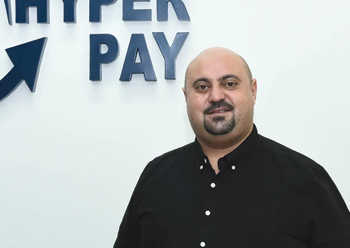
 Muhannad Ebwini
Muhannad Ebwini
Since the acceleration of digitalisation brought on by the pandemic, fintech’s growth has shown no sign of slowing down. At HyperPay, the fastest-growing payment services provider in the Middle East and North Africa (Mena), we enable businesses of all sizes to accept payments online in no time, and with no extra cost, so they can improve their chance of survival in an increasingly digitised world.
Fintech Saudi recently found that over 70 per cent of people aged 16-49 in the region use at least one fintech solution. With adoption rates this high, it’s paramount that players in the region work fast and utilise the latest technology to their full advantage to avoid missing out on opportunities for growth.
That’s why forming a solid partnership with major companies like Mastercard was such a significant step in HyperPay’s expansion. HyperPay’s latest $36.7 million funding round, led by Mastercard, Amwal Capital Partners and AB Ventures, will allow us to meet our customers’ evolving needs by investing in research and development, hiring staff, and delivering new and innovative solutions for businesses, governments and SMEs to go cashless.
Having a full and clear understanding of government regulations is also key. However, this poses specific complexities, as regulator bodies need to keep up with new and evolving technologies and emerging business models are often met with the lack of necessary laws to support them. Common legal concerns to take into account include foreign ownership laws, cyber and privacy laws, intellectual property protection and compliance risks.
More recently, governments have been taking steps to support the digital transformation taking place. And regulators are increasingly acknowledging the need for legislative reforms to capitalise on fintech’s growth in the region. And as part of their Saudi Vision 2030 goals, Saudi Arabia has set a target to achieve 70 per cent cashless transactions by 2030, which reinforces HyperPay’s guiding mission and our belief that betting on e-payments will continue to pay off.
Operating in the Mena region, it is important to focus on each country independently, recognising that the area presents vast differences within its borders. Our latest funding round will allow us to broaden our geographical expansion in Egypt, Qatar, and Oman as well as build on our existing business across KSA, UAE, Jordan, Lebanon, and Bahrain.
Expanding quickly and maintaining a competitive edge is key, as the market is now large enough to attract international competition and interest from overseas players. Another option is to target only one country and focus on scaling locally, as this eliminates the trouble of managing the entirety of the Middle East from one territory and supports the need for product localisation country by country.
A strategic emphasis on localisation can help boost revenue as well as consumer trust, but doing it right is no easy feat. In addition to payment processing services, HyperPay provides merchants with services like risk and fraud management, monitoring system, instalments and invoicing systems. Offering such a broad array of products to businesses ranging from the smallest to the largest enterprises, we understand the importance of localising per sector, and sometimes per merchant, with each new offering.
Today, an online presence is just as important a sales channel as a retail location, and fintech players need to be quick to respond to the changing needs of their partners within an entirely new landscape.
The global fintech market is expected to be worth $305 billion by 2025. The growing sector will add tremendous value to the Mena region, which can encourage innovation and expansion as consumers in the Middle East increasingly rely on apps and digital platforms. It pays to understand the market, to work well, and to work fast!
